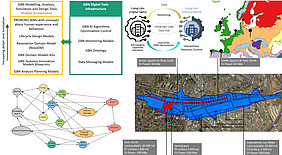The PROBONO project (The Integrator-centric approach for realising innovative energy efficient buildings in connected sustainable green neighbourhoods) was selected among 115 project proposals for the Horizon 2020 Framework Programme call LC-GD-4-1-2020: Building and renovating in an energy and resource efficient way. Now the project is officially started!
The ambition for sustainable and green buildings across Europe has encountered a number of barriers (e.g., as related to high upfront construction costs, access to capital, social attitudes, lack of information, experience and incentives). To answer the challenges related to the green building market, the Horizon 2020 PROBONO project envisions a people-focused European construction industry working in harmony with the broader community of stakeholders. Here, public authorities and citizens are involved with the purpose to deliver scalable, sustainable, and viable energy positive and zero-carbon green buildings and neighbourhoods.
The project’s ambition is to provide validated solutions for the design, construction, and operation of new and/or retrofitted zero-pollution and positive energy buildings as part of sustainable green neighbourhood developments. The type of neighbourhoods will be piloted across six EU states where the PROBONO living labs will be established.
The living labs will be linked to business and municipality greening plans. More specifically, the six PROBONO living labs will include two municipality driven large-scale demonstrators (Madrid and Dublin) and four living labs representing business/owner promoters of the green buildings and neighbourhoods’ transition (Porto, Brussels, Aarhus, Prague).
To achieve its goal, PROBONO will provide five transition acceleration enablers, as related to:
- strategic planning
- social engagement and innovation support
- green energy
- construction and renovation
- digitalisation for data-driven investment process and resource optimisation
Integratively utilizing on those enablers and deploying them across six high impact and people-focused real-life large-scale living labs, PROBONO will show how technological and social innovations related to green buildings and neighbourhoods can be applied.
Having a systems-based approach to the buildings’ infrastructure and a renewed focus on people and sustainability, the project will fully exploit digitalisation and smart technologies for the benefit of society. Finally, to enhance wide-scale adoption and standard creation, PROBONO will contribute with evidence-based policy recommendations, standardisation actions, and robust adoption and commercialisation strategies.
Technical University of Crete is mainly responsible for leading the development of Digital Twin Models of Innovations for Smart Green Building Construction and Renovations, as well as the development of Knowledge Graphs and Agent-based modelling towards the analysis and control of complex systems and processes in the Living Labs. Dr. Denia Kolokotsa, Professor and Dean at the School of Chemical and Environmental Engineering of the Technical University of Crete and head of Energy Management in the Built Environment Research (EMBER) lab, is in charge of the scientific management and coordination team. EMBER has a long lasting involvement in research and innovation EU funded projects related to smart buildings, smart communities and smart grid energy management emphasising on renewable energy technologies and modern predictive control techniques using artificial neural networks, fuzzy logic, genetic algorithm optimisation etc.
The project involved 47 partners from 15 different countries, for a 5-years project duration (2021-2026). Its total budget is EUR 25,252,011 and will receive a funding from the EU of EUR 20,158,449.
This project receives funding from the European Union’s Horizon 2020 Research and Innovation programme under Grant Agreement No 101037075. |
The information and views set out in this press release are those of the author(s) and do not necessarily reflect the official opinion of the European Union. Neither the European Union institutions and bodies nor any person acting on their behalf may be held responsible for the use which may be made of the information contained therein.


